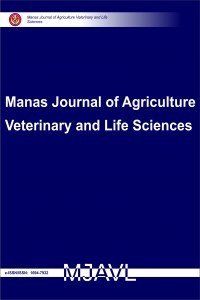Lethal Mutagenesis in Viruses and Its Effects
Mutagenesis, Virus, Chemical,
___
- Acevedo A, Brodsky L, Andino R (2014). Mutational and fitness landscapes of an RNA virus revealed through population sequencing. Nature 505, 686–690.
- Bassi M R, Sempere R N, Meyn P, Polacek C, Arias A (2018). Extinction of Zika Virus and Usutu Virus by Lethal Mutagenesis Reveals Different Patterns of Sensitivity to Three Mutagenic Drugs Antimicrob Agents Chemother,27;62(9):e00380-18.
- Bull J J, Sanjua´n R, Wilke O C (2007). Theory of lethal mutagenesis for viruses. J. Virol. 81:2930–2939.
- Domingo-Calap P, Pereira-Gómez M, Sanjuán R (2012). Nucleoside Analogue Mutagenesis of a Single-Stranded DNA Virus: Evolution and Resistance J Virol, 86(18):9640-6.
- Drake J W, Holland J J (1999). Mutation rates among RNA viruses. PNAS,23, 96(24) 13910-13913 Duffy S (2018). Why are RNA virus mutation rates so damn high. PLoS Biol 16:8.
- Fonville J M, Wilks S H, James S L, Fox A, Ventresca M, Aban M, Xue L, Jones T C, Le N M H, Pham Q T (2014). Antibody landscapes after influenza virus infection or vaccination. Science 346(6212): 996–1000.
- Graci J D, Harki D A, Korneeva V S, Edathil J P, Too K, Franco D, Smidansky E D, Paul AV, Peterson B R, Brown D M, Loakes D, Cameron C E (2007). Lethal mutagenesis of poliovirus mediated by a mutagenic pyrimidine analogue. J. Virol. 81:11256 –11266.
- Graci J D, Too K, Smidansky E D, Edathil J P, Barr E W, Harki D A, Galarraga J E, Bollinger J M Jr, Peterson B R, Loakes D, Brown D M, Cameron C E (2008). Lethal mutagenesis of picornaviruses with N-6- modified purine nucleoside analogues. Antimicrob. Agents Chemother. 52:971–979.
- Graci J D, Cameron C E (2006). Mechanisms of action of ribavirin against distinct viruses. Rev. Med. Virol. 16:37–48.
- Morfin F, Thouvenot D (2003). Herpes simplex virus resistance to antiviral drugs. Journal of Clinical Virology 26:29-37.
- Pauly M D, Lauring A S (2015). Effective Lethal Mutagenesis of Influenza Virus by Three Nucleoside Analogs J Virol,89(7): 3584-97.
- Pfeiffer J K, Kirkegaard K (2003). A single mutation in poliovirus RNA-dependent RNA polymerase confers resistance to mutagenic nucleotide analogs via increased fidelity. Proc. Natl. Acad. Sci. USA 100:7289–7294.
- Rotem A, Serohijos A W R, Chang C B, Wolfe J T, Fischer A E, Mehoke T S, Zhang H, Tao Y, Ung W L, Choi J M, Rodrigues, J V, Kolawole A O, Koehler S A, Wu S, Thielen P M, Cui N, Demirev P A, Giacobbi N S, Julian T R, Schwab K, Lin J S, Smith T J, Pipas J M, Wobus C E, Feldman A B, Weitz D A, Shakhnovich E I (2018). Evolution on the Biophysical Fitness Landscape of an RNA Virus Mol. Biol. Evol. 35(10):2390–2400
- Sanjua´n R, Domingo-Calap P (2016). Mechanisms of viral mutation Cell. Mol. Life Sci 73: 4433–4448.
- Sanjuán R (2010). Mutational fitness effects in RNA and single-stranded DNA viruses: common patterns revealed by site-directed mutagenesis studies. Philos Trans R Soc Lond B Biol Sci. 27;365(1548):1975-82
- Severson W E, Schmaljohn C S, Javadian A, Jonsson C B (2003). Ribavirin causes error catastrophe during Hantaan virus replication. J. Virol. 77:481–488
- Sierra M, Airaksinen A, González-López C, Agudo R, Arias A, Domingo E (2007). Foot-and-mouth disease virus mutant with decreased sensitivity to ribavirin: implications for error catastrophe. J. Virol. 81: 2012–2024.
- Sierra S, Da´vila M, Lowenstein P R, Domingo E (2000). Response of foot-and-mouth disease virus to increased mutagenesis: influence of viral load and fitness in loss of infectivity. J. Virol. 74:8316–8323
- Tang J, Brixel R, Brune W (2019).Copy-Paste Mutagenesis: A Method for Large-Scale Alteration of Viral Genomes Int J Mol Sci. 20(4): 913.
- Yang W, Wang Q, Howell KL, Lee J T, Cho D S (2005).ADAR1 RNA deaminase limits short interfering RNA efficacy in mammalian cells. J Biol Chem. 280:3946–3953.
- Yeşilbağ K (2002). Mutational Changes and Importance in Veterinary Virology. Uludag Univ. J. Fac. Vet. Med. 21; 125-131
- Zinshteyn B, Nishikura K (2009).Adenosine-to-inosine RNA editing Wiley Interdiscip Rev Syst Biol Med.1(2): 202–209.
- ISSN: 1694-7932
- Yayın Aralığı: 2
- Başlangıç: 2013
- Yayıncı: KIRGIZİSTAN-TÜRKİYE MANAS ÜNİVERSİTESİ
Dilek KANDEMİR, Güldane Tuğba ŞAHİN, Ahmet BALKAYA, Şeyma SARIBAŞ
Dört Yaşlı Erkek Bir Kedide Nekrotik Glossitis Olgusu
Fatih HATİPOĞLU, Abuzer TAŞ, İsmail ŞEN, Aiperi AİTMYRZA KYZY, Nur ABDIMANAP UULU
Yaşar ERTÜRK, Ramazan CAKMAKCI, Meral KUTLU, Hakan KELES
Tair ESENALI UULU, Elaman KANATBEK UULU, Şenol YILDIZ
Osman GEDİK, Yusuf Ziya KOCABAŞ, Orçun ÇINAR
MAPK Modüllerinin Bitki İmmünitesindeki Yolculuğu
Kafkas Vaşağında (Lynx lynx dinniki) Nervus Phrenicus’un Orijini, Seyri ve Dağılımı
Hasan Hüseyin ARI, Lutfi TAKCI, Nilgun KURU
Van İli Koyunlarında Dictyocaulus filaria’nın Moleküler Karakterizasyonu
